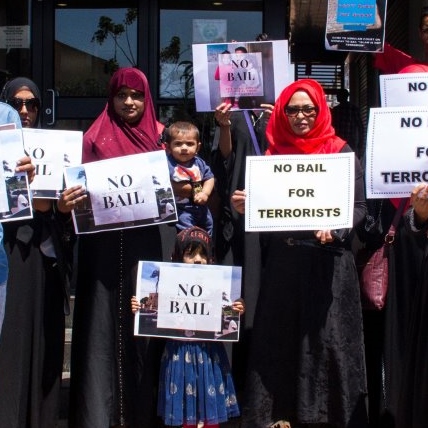
News

Police affidavit confirms CSO terror fears
JACQUELINE HERBST
It confirms the concern voiced recently by the Community Security Organisation (CSO) about the threat and presence of the militant ISIS in South Africa.
In his affidavit, Warrant Officer Khwezi Chonco revealed that when he arrested businessman Farhad Hoomer, along with 18 other suspects, in Reservoir Hills in Durban on 5 October, he found “devices” that indicated Hoomer’s support and commitment to ISIS.
Hoomer, whom Chonco identified as the leader of the group, was also in possession of a photo of himself wearing an ISIS beanie. He found ISIS propaganda material that incites violent jihad [holy war] and contains instructions on how to carry out home assassinations, manufacture parcel bombs, magnetic car bombs, and a door-trap bomb. There were also ISIS newsletters and magazines, manuals for making a cellphone detonator, and bomb-making plans and recipes, according to Chonco’s affidavit.
The affidavit stated that Ahmed Haffejee, the brother of Goolam Haffejee who was released on R100 000 bail, belonged to the same WhatsApp group as Sayfudeen Aslam Del Vecchio and Fatima Patel’s accomplice, Jackson Mussa. The latter two were involved in the abduction, extortion, and murder of Rod and Rachel Saunders earlier this year.
The WhatsApp group shared violent images of a beheading, and its name written in Arabic translates as Junjullah which means “Soldiers of G-d”. Junjullah is a Sunni Militant Organisation based in Iran which fights for Sunni rights and encourages the destruction of Shia mosques (the Imam Hussain Mosque in Verulam where the attack took place is a Shia mosque). Preliminary downloads from a device confiscated from Ahmed Haffejee indicate that, like Hoomer, he was also in possession of ISIS magazines and propaganda material.
“I am confident that when the matter is set down for trial, considerably more evidence will be obtained. The fact that the charges all relate to furthering the terrorist objectives of ISIS would in my view be extremely serious aggravating circumstances justifying long-term direct imprisonment,” said Chonco.
CSO Gauteng Director Jevon Greenblatt said the organisation’s concerns were based on an understanding of the environment we find ourselves in now, and what the perpetrators are doing, rather than who they are associated with. He said ISIS was only a label, and people shouldn’t get stuck on their association with the organisation. Rather, they should focus on the kinds of acts being perpetrated to further the cause of radical Islam.
“I believe the aim of the incidents are two-fold,” said Greenblatt. “First, they indicate a financial jihad through extorting and stealing money from ‘non-believers’ to fund recruitment and training camps, the purchase of materials which leads to the second aim, which is violent jihad.”
Greenblatt is concerned about the South African Jewish community’s vulnerability to attacks from various groups. He pointed to the surfacing of anti-Semitic comments on social media, calling for attacks on the community. However, Greenblatt assured the community that the CSO was watching the situation closely, and had taken every precaution to ensure the security of the community.
Holding a more sceptical view, Jasmine Opperman, the head of the Africa desk at the Terrorism Research and Analysis Consortium, questioned the strength of the evidence linking the mosque-attack suspects to ISIS.
“A concerning factor is that the Hawks and police are now stating that South Africa has crossed a threshold [of] violent attacks by organised international terror groups. But, where is the evidence? The Thulsie [Twins] case has already had the state stumbling in putting evidence on the table.”
Opperman said the presence of Islamic State loyalists on South African soil could not be denied, but looking at the kidnappers, the indications were that they fitted into a “wannabe” category rather than being actual members. The wannabe typically seeks instantaneous recognition, credentials and sometimes redemption, and has missed out on a life in a caliphate or training camp in Yemen or Somalia. She reiterated, however, that just because a loyalist is untrained doesn’t mean he is not dangerous.
Because of the reach of social media, terror groups no longer needed to gather at the same physical location to rally for violence, and create a community of like-minded individuals who dislike the West.
“What just does not make sense is that out of ten bomb scares over a short period of time, none exploded. If the house (at which they were arrested) was used as a ‘training camp’, surely one of the bombs would have exploded and killed people. Again, all pointers direct to intense business competition and extortion, a tactic never propagated by Islamic State.”
Willem Els, Senior Training Co-ordinator for the Transnational Threats and International Crime Programme, believes that this case serves as a wake-up call for the government.
“We understand that the capacity of police intelligence and the Hawks has been affected by the situation in government over the past few years. The very fact that the prosecution leans heavily on the ISIS connection, indicates the seriousness in which it views this situation. Every time the court sits, we hear about more and different links between ISIS and the group, and that raises an alarm.”
Els said it was impossible to tell at this stage if there were more cells operating within our borders. He said we should be worried, as linking this cell to the so-called Del Vecchio cell (that kidnapped and murdered Rachel and Rod Saunders), that is in turn possibly linked to the Thulsie Twins cell via the Patel connection, might just be tip of the iceberg.
The possibility of the 11 suspects being granted bail raises red flags. “The rule of thumb is that you need six to seven operatives to effectively place one subject under effective surveillance, and should they be released, it would place a tremendous strain on the recourses and manpower of the state.”
The bail application will continue on 6 November.




